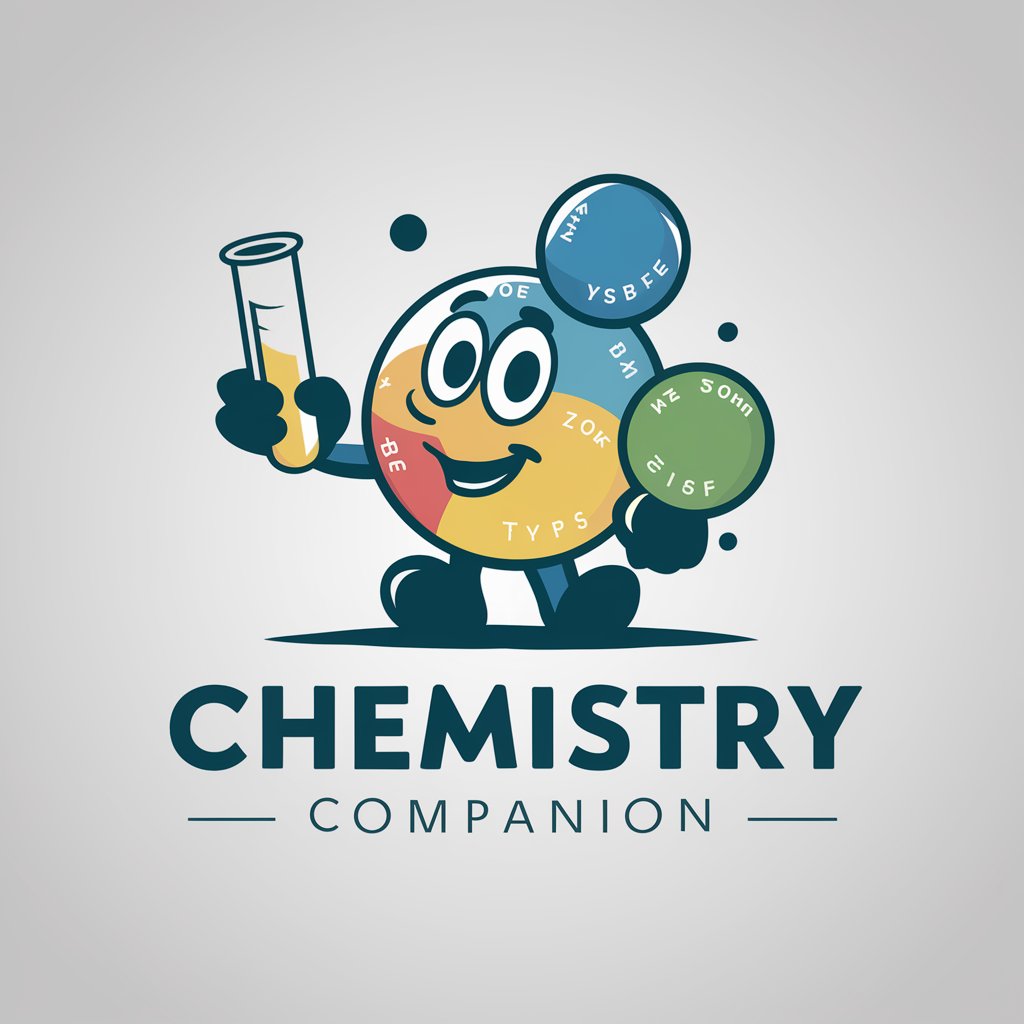Chemistry Companion - Chemistry Learning Tool

Welcome to Chemistry Companion! Let's make chemistry fun and easy!
Empowering chemistry learning with AI
Can you explain how to balance chemical equations?
How do intermolecular forces affect boiling points?
What is the electron configuration of iron?
Can you help me understand the concept of molarity?
Get Embed Code
Overview of Chemistry Companion
Chemistry Companion is designed as an interactive, digital tutor focused on aiding users in understanding and applying chemical concepts and calculations. It integrates an advanced code interpreter to solve complex chemistry problems, making it ideal for computational chemistry tasks. This tool clarifies ambiguous queries to ensure accurate responses and tailors explanations to the user's level of understanding, from beginners to advanced learners. For instance, when explaining molecular structures, Chemistry Companion can generate diagrams or perform calculations to illustrate bond angles or molecular geometry. Powered by ChatGPT-4o。

Core Functions of Chemistry Companion
Chemical Equation Balancing
Example
Balancing the reaction equation for the combustion of propane.
Scenario
A user inputs an unbalanced equation of propane combustion. Chemistry Companion provides a step-by-step guide to balance the equation, explaining the principle of conservation of mass and the stoichiometry involved.
Molarity and Concentration Calculations
Example
Determining the molarity of a sodium chloride solution.
Scenario
A student is preparing a lab experiment and needs to create a 0.5 M NaCl solution but is unsure how to calculate the required solute amount. Chemistry Companion offers a detailed calculation process, including the formula and steps to achieve the desired concentration.
Reaction Yield and Limiting Reagents
Example
Calculating the theoretical yield of a reaction and identifying the limiting reagent.
Scenario
In a synthesis reaction, a user wants to know how much product can be expected from given amounts of reactants. Chemistry Companion explains how to identify the limiting reagent and calculates the theoretical yield, emphasizing the importance of stoichiometry in real-world applications.
Target User Groups for Chemistry Companion
Chemistry Students
Students at various educational levels can benefit from personalized tutoring, especially in understanding complex topics, solving homework problems, and preparing for exams. Chemistry Companion's ability to break down complex concepts into understandable steps makes learning more accessible.
Chemistry Educators
Teachers and professors can use Chemistry Companion as a supplementary tool to enhance their teaching methods, create interactive classroom activities, and provide students with additional resources for self-study.
Research Scientists
Professionals in research fields requiring chemical analysis and computations can use Chemistry Companion for quick calculations, verifying experimental data, or exploring theoretical concepts to aid in their research projects.

How to Use Chemistry Companion
1
Start by visiting yeschat.ai to access Chemistry Companion for an immediate, free trial without the need for registration or a ChatGPT Plus subscription.
2
Identify the chemistry topic or problem you need assistance with. Chemistry Companion covers a wide range of topics from basic chemical principles to advanced computational chemistry.
3
Formulate your question or problem statement clearly and precisely. If you're working on a calculation or need help with a chemical reaction, provide as much relevant detail as possible.
4
Use the provided chat interface to enter your question. You can ask for explanations, step-by-step solutions, or code-based demonstrations for more complex problems.
5
Review the response from Chemistry Companion. If needed, ask follow-up questions for clarification or further information. You can also request different approaches to the problem for a deeper understanding.
Try other advanced and practical GPTs
Devil's Advocate
AI-powered Realistic Business Feedback

STEM Tutor
Empowering STEM learning with AI

Bible Encourager
Find Solace in Scripture, Powered by AI

Fabio Cantone
Transform your code with AI power

Cantinflas GPT
Bringing Humor to AI Interactions

Life Growth - Money, Self Development
Empower your potential with AI-driven guidance.

Remotobot Devschile
Empowering Your Chilean Remote Work Experience

Econometrics
AI-powered econometrics for accurate data analysis

Stellar Guide
Illuminate Your Life with AI-Powered Astrology

FuelMyFitness
Optimize your diet, power your fitness.

IOS Creator
Empowering iOS Development with AI

ModuleGPT
Harness AI to Power Every Project

Frequently Asked Questions about Chemistry Companion
Can Chemistry Companion help with organic chemistry?
Yes, Chemistry Companion can assist with organic chemistry topics, including reaction mechanisms, nomenclature, and synthesis problems, providing explanations and solving related queries.
Is Chemistry Companion suitable for high school students?
Absolutely. Chemistry Companion is designed to be accessible to learners at all levels, including high school students, offering clear explanations and guidance for understanding basic to advanced chemistry concepts.
How does Chemistry Companion handle chemical equation balancing?
Chemistry Companion uses algorithmic approaches to balance chemical equations, providing step-by-step explanations and even code demonstrations to show how equations can be balanced using computational methods.
Can I use Chemistry Companion for research purposes?
Yes, Chemistry Companion can be a valuable tool for researchers needing to calculate molecular properties, understand reaction dynamics, or simulate chemical processes, offering both explanations and computational solutions.
Does Chemistry Companion support chemistry educators?
Definitely. Educators can use Chemistry Companion as a teaching aid to explain complex concepts, provide extra practice problems, and enhance their teaching materials with interactive, code-based examples.
